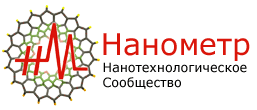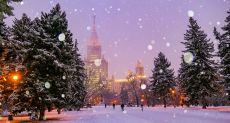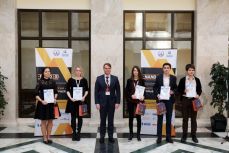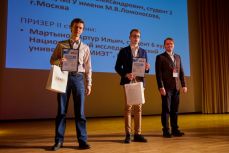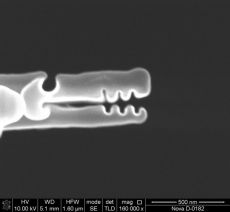Introduction
The National Student Team Contest is a national stage of the International Olympiad on Nanotechnology (International NanoOlympiad, INO) having a goal to select an effective and capable student team for participation in INO with a support of the Organizing Committee of the Russian Internet Olympiad on Nanotechnology (RION) “Breakthrough to the Future”. The 1st INO has been conducted in April of 2018 in Tehran by Iran, Russia, South Korea, Germany, Great Britainn, Malasia, Taiwan with a growing number of new countries joining the INO society.
The INO is an annual collaborative international event which holds an international competition among university level students (Appendix 1 and 2) and could combine a pre-olympic scientific conference for young scientists (Appendix 3) and the Olympiad itself. INO is organized to improve motivation of the students towards deeper knowledge in nanotechnology and better skills for innovative applications of real scientific and industrial problems. It is also a platform for international collaboration and networking in the relevant areas of nanotechnology. Participants propose their competitive ideas and plans as nanotechnology based solutions for focused problems related to global challenges. These rules are based on regulations of RION and take into consideration of the regulations of INO.
The Contest
The NSTC is a competition among bachelor and master students of higher school in Russia considering theoretical, experimental and creative skills based on nanotechnology and nanomaterials subjects. The Contest selects the best national team members for participation in the International NanoOlympiad contest on nanotechnology as determined by annual regulations of INO. The NSTC consists of two main steps – a distant stage demanding preparation of short overviews of a proposed experimental project and its possible practical applications (Appendix 1 and 2) and a consulting stage with experts of RION after selection of the NTSC winners. The sum achievements of both the stages will play the main role for the formation of a Russian Nation Team of Students in nanotechnology assumed to take part in the INO. The NTSC is a part of the RION, by definition. The official language for the Contest is English. PhD level students can join the Contest by special approval to be received from RION.
The Scope
NSTC includes but not limited for both theoretical skills, experimental studies and searching for innovative solutions in the fields of nanotechnology as closely related to modern materials science, physics, optics, inorganic, organic, analytical, physical chemistry, biochemistry, biophysics, nanomedicine, engineering of high-tech devices and IT technology, material treatment, technical entertainment, marketing of nanotechnology products.
The Goal and Tasks
The mail Goal of NSTC consists in selection of the best students to demonstrate national team achievements on the international level.
The Contest tasks include:
- dissimilation of advanced knowledge and state-of-art on modern nanotechnology, nanomaterials, material processing and practical analytical tools among future specialists in nanotechnology and other high technologies of the modern society,
- improving skills, knowledge and mind of nanotechnology specialists,
- cultivating the spirit or research and development among talented youth,
- selection and promotion of best students in the field of nanotechnology,
- creation of national and international cross links between research teams,
- development of new ideas and approaches in the field of nanotechnology and nanomaterials.
Organizers
Lomonosov Moscow State University and the Fund for Infrastructure and Educational Programs are the organizers of RION and NSTC as a part of RION. At the same time, the NTSC program and regulations are being coordinated in accordance with the annual INO rules to provide better results of National Student Team participation in the INO. Persons responsible for contacting with INO representatives are named from the RION Organizing Committee official members. The NSTC Jury has to be formed by the Organizers among leading scientists and researchers in the field of nanotechnology, chemistry, physics, biology, innovations. The Jury rates the solutions of the participants on the basis of full independence, transparency and scientific ethics. The final results are confirmed by the responsible representatives of the Organizers prior to a public announcement of the winners of the contest. The winners are supported within the budget limits of RION in terms of travel and living expenses in Moscow and travel expenses to INO with limited finding of their stay in the host country of INO.
Participation
All the participants must register using the official Internet platform of RION http://enanos.nanometer.ru. Registration is followed by preparation and submission of overviews of a project according to Appendix 1 and 2 followed by pre-selection of the participants for the second, consulting, stage of the contest in Moscow. Only BS and MS students (with rare exceptions for PhD students), the citizens of Russian Federation, are legible to participate. All the participants must be polite, tolerant and well skilled through the entire competition process. The first selection stage involves individual participants, the second, consulting, stage forms a national student team as a main unit for the further competition aimed to be continued during INO. The proposals of the participants are the subject of copyrights of the authors, the RION / INO do not intend to use the materials for any purpose except the selection procedure. The materials cannot be published without a permission of authors.
Time Schedule
The starting date of NSTC is the same as for RION and should begin within the first decade of December. The ending point of the first, theoretical, part should be limited by the end of January. The second, consulting, stage and the final selection procedure of the National Student Team should be settled on the end of March being the closing point of RION. The post-olympiad support of the Team is scheduled in accordance with the announcement of INO. The planning of the visit of the Team in the host country of INO is scheduled according to the regulations of INO.
Final Remarks
Web site of RION – http://enanos.nanometer.ru, web site of the Fund for Infrastructure and Educational Programs – http://www.rusnano.com/infrastructure.
Contacting address – enanos@nanometer.ru. Web site of INO http://nanoolympiad.org/, see also INO regulations.
Appendix 1. Recommended structure of the Part 1. Scientific Proposal (SP) of the joint Proposal demanded for all the participants of the National Student Team Contest (totally 60% of scores)
SP is the first part of the combined proposal demanded from all the participants of the National Student Team Contest to be successfully selected for the participation in the International Olympiad on Nanotechnology (INO). Another, second, part includes the Implementation Proposal (Part 2, IP, Appendix 2). Both Part 1 and Part 2 must be presented as a single file of the joint proposal with all the text descriptions, illustrations, references etc. within the file.
Language: English
Aim: to represent scientific and experimental overview / background of a proposed project
Recommended length: 5 – 7 pages with all demanded illustrations (A4 size, 2 cm margins from all the sides, Arial 14 pt font, single space)
Project scientific / experimental description and scores:
- Project title (3 – 20 words, score 0 – 2)
- Abstract (10 – 300 words, score 0 – 8)
- Introduction (a global problem, project aim, taks, actuality, novelty, score 0 – 10)
- Approach (suggested possible solutions, experimental procedures and features, etc., score 0 – 10)
- Discussion (explanations of scientific novelty and effectiveness of the suggested solutions and approaches, score 0 – 25)
- Descriptive conclusions (score 0 – 3)
- References (score 0 – 2)
Total score – 60
Appendix 2. Recommended structure of the Part 2. Implementation Proposal (IP) of the project results of the joint Proposal demanded for all the participants of the National Student Team Contest (totally 40% of scores)
IP is the second part of the combined proposal demanded from all the participants of the National Student Team Contest to be successfully selected for the participation in the International Olympiad on nanotechnology (INO). Another, first, part includes the Scientific Proposal (Part 1, SP, Appendix 1). Both Part 1 and Part 2 must be presented as a single file of the joint proposal with all the text descriptions, illustrations, references etc. within the file.
Language: English
Aim: to represent and explain the practical impact of the proposed project and its possible commercial implementations
Recommended length: 2 – 3 pages with all needed illustrations (A4 size, 2 cm margins from all the sides, Arial 14 pt font, single space)
Project commercial / implementation impacts and scores:
- Implementation (possible practical aplications of the project in devices / products, score 0 – 10)
- Impact (focused explanation why the project can influence our life / society, score 0 – 10)
- Analogues (comparison with analogues to show novely and effectiveness, score 0 – 10)
- Cost (numbers and estimations why the project results would be attractive for global or local market, implementation schedule, protection of intellectual properties, possible start up investments, cost effectiveness and possible income / earning by years, stages of project implementation and growth, score 0 – 10)
Total score – 40
Appendix 3. International Young Scientist Forum (IYSF)
Scope: IYSF scope includes but is not limited by a wide range of nanotechnology related areas being more focused on nanotoxicology issues and regulations, chemical, physical and biology related production processes of nanomaterials and their scalability, application of nanomaterials in practice and their impact on ecology, environment and society, technical aspects of implementation of innovative findings.
Goal: IYSF goal is to collect, discuss and dissimilate trends in science and application of nanotechnology products among students and young researchers, to promote their career and to support ongoing and future studies in the framework of collaborative discussion of major scientific, experimental issues and work perspectives with leading scientists and industry representatives.
Interrelations with INO: IYSF is a self-sufficient supporting event of INO meaning a high-level scientific conference with a useful discussing panel of INO-related issues promoting deeper involvement and wider participation of young audience in INO. Vice versa, INO might promote better participation of INO international teams in IYSF.
Relations with other organizations: IYSF is guided by its own organization structure which might include INO representatives selected with respect to their scientific fields and practice related to the IYSC scope.
Eligible participants: PhD students, young scientists, students of any year of study from Universities, Institutes, Companies and Academies selected by the IYSF committees on the basis of their applications and conference registration.
Pre-requirements: no additional requirements are needed except a valid application and proper conference registration.
Procedure of application for IYSF: all IYSF participants should register themselves normally and apply individually, a letter of support would be also sent out by national councils of INO in order to require participation of all the national team members in IYSF at once. Applications should list the available IYSF events in which the participants would like to be involved in addition to necessary presentation of scientific results.
Support of participants: IYSF promises organization support only including the list of recommended hotels, visa support, preparation of IYSF program etc. The other types of support are a subject of separate discussion depending on available funds, partners or sponsors.
Awards: 3 to 5 participants should be awarded by prestigious diploma with respect of their scientific, public or team presentations.
Publication issues: a Scopus / WoS journals should reserve a possibility to publish peer reviewed articles of best young scientists, all the abstracts should be available via web or could be printed and distributed as a conference book abstract or, better, a CD / DVD disk / flesh stick / card.
Information support: web support, e-mail distribution, IYSF conference site, INO site, www.nanometer.ru and other national sites by collaboration with national INO team leaders.
Features and events: TED- and standup-like talks of selected young researchers, team competitive work, workshops and / or master classes on innovations and safety in nanotechnology, oral and poster scientific sessions, INO technical planning meeting, general photo session, dissimilation of the materials in the Internet.
